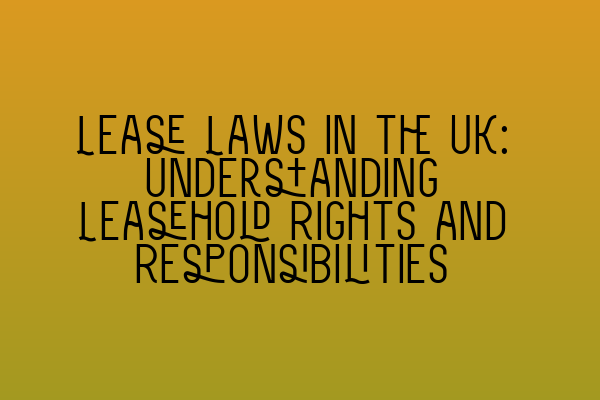Lease Laws in the UK: Understanding Leasehold Rights and Responsibilities
Welcome to the SQE Property Law & Land Law blog, where we provide expert insights into various aspects of property law in the UK. In this post, we will dive deep into the complexities of leasehold rights and responsibilities. If you are a property owner or tenant, understanding lease laws is crucial for a smooth and hassle-free experience. So, let’s explore the intricacies of leasehold in the UK.
What is a Leasehold?
A leasehold is a type of property ownership where an individual (the leaseholder) owns a property for a fixed period of time but not the land on which it stands. The land is usually owned by a separate entity, referred to as the freeholder or landlord. Leasehold properties are typically found in flats, apartments, and some houses.
Having a leasehold property means that you have a legal agreement with the landlord, outlining the rights and responsibilities of both parties. These agreements, called leases, govern various aspects of the property, including the length of the lease, ground rent, service charges, and maintenance obligations.
Leasehold Rights
As a leaseholder, you have certain rights granted by law. These rights include:
- Occupancy: You have the right to occupy the property for the duration of the lease.
- Use and Enjoyment: You have the right to use and enjoy the property in line with the terms outlined in the lease.
- Rent and Service Charges: You have the right to be charged a reasonable rent and service charges, as outlined in the lease agreement.
- Repairs and Maintenance: The landlord is responsible for certain repairs and maintenance of the property, as stipulated in the lease.
- Extension of Lease: In some cases, you may have the right to extend the lease upon expiry, subject to certain conditions and qualifications.
Understanding these rights is crucial for protecting your interests as a leaseholder and ensuring a fair and harmonious living arrangement.
Leasehold Responsibilities
Alongside rights, leasehold ownership also comes with certain responsibilities. As a leaseholder, you are expected to:
- Pay Ground Rent: You are obliged to pay the ground rent to the landlord, as specified in the lease agreement.
- Pay Service Charges: Service charges cover the costs associated with the maintenance and repair of communal areas, such as lifts, hallways, and gardens. As a leaseholder, you are responsible for paying these charges.
- Maintain the Property: You have a responsibility to maintain the property in good condition, including the interior of your dwelling.
- Observe Lease Restrictions: The lease may include certain restrictions on alterations, subletting, and pets. It is your responsibility to abide by these restrictions.
- Comply with Lease Terms: You are obligated to comply with all the terms and conditions outlined in the lease agreement.
By fulfilling these responsibilities, you contribute to the smooth running of the property and maintain a positive relationship with the landlord and other residents.
Understanding Lease Length
Lease lengths vary depending on the terms agreed upon between the landlord and the leaseholder. Common lease lengths in the UK are typically between 99 and 125 years for flats and apartments. Lease lengths for houses can be longer, ranging from 99 to 999 years.
It is essential to consider the lease length when purchasing a leasehold property, as a shorter lease remaining can affect its value and potential marketability in the future. Additionally, as the lease approaches its expiration date, it may be necessary to extend the lease to maintain the value of the property.
Extending the Lease
If you are a leaseholder nearing the end of your lease, it may be possible to extend it through a process called lease extension. Lease extension allows you to extend your lease for a specific period, subject to certain conditions and qualifications.
The lease extension process can be complex, involving formal notices, valuation assessments, and potential negotiations with the landlord. Seeking legal advice from a solicitor specializing in property law is highly recommended to navigate this process smoothly.
For comprehensive information on lease extensions, visit our related blog post: Lease Extensions: A Guide for Leaseholders.
Leasehold Enfranchisement
Leasehold enfranchisement refers to the process of acquiring the freehold of a property or extending the lease collectively as a group of leaseholders. This process allows leaseholders to have more control over their properties and potentially increase the value of their holdings.
If you are interested in leasehold enfranchisement, our article on Leasehold Enfranchisement: A Path to Property Ownership provides in-depth information and guidance on the topic.
Seeking Legal Advice
Understanding leasehold rights and responsibilities can be complex, especially considering the various legalities involved. If you require further assistance or have specific questions about your leasehold property, it is advisable to consult with a solicitor specializing in property law.
At SQE Property Law & Land Law, our team of experienced solicitors can provide the guidance and support you need to navigate leasehold matters effectively. Contact us today to schedule a consultation.
For more information on our legal services and expertise in property law, visit our website: SQE Property Law & Land Law.
Conclusion
Leasehold ownership is a unique arrangement that comes with both rights and responsibilities. Understanding lease laws in the UK is crucial for both leaseholders and landlords to ensure a fair and harmonious living arrangement.
By knowing your leasehold rights, fulfilling your responsibilities, and seeking expert legal advice when needed, you can navigate the complexities of leasehold with confidence.
For more information on property law and related topics, explore our other helpful articles:
- SQE 1 Preparation: Your Guide to Success
- SQE 2 Preparation: Mastering Property Law
- SRA SQE Exam Dates: Timetable and Preparation Tips
Stay informed and empowered with SQE Property Law & Land Law.
